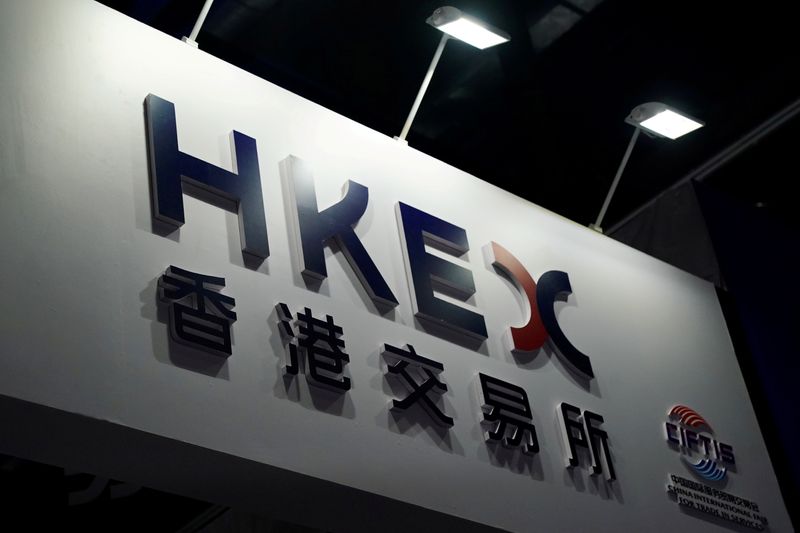SHANGHAI (Reuters) - Hong Kong stocks jumped 9% on Wednesday to mark their best day since 2008, after China's top policymaker assured markets of stability and support and helped put a floor under sectors hurt by a regulatory crackdown.
Vice Premier Liu He said Beijing would roll out support for the Chinese economy as well as be cautious with measures for capital markets.
The Xinhua news agency also cited Liu as saying, at a meeting of the Financial Stability and Development Committee under the State Council, that regulators would coordinate better with their counterparts in Hong Kong.
The comments came a day after China stocks slumped to 21-month lows and mainland firms listed in Hong Kong plumbed 2008 lows.
Chinese stocks have been pummelled this year by rising domestic COVID-19 cases, fears about a blowback on China from its dealings with the sanctions-hit Russia, and continued regulatory crackdowns, including the risk of more mainland firms being delisted by U.S. exchanges.
Liu's assurances helped the Hang Seng index claw back all the ground lost on Tuesday and more. The HSI surged more than 9% to above the 20,000-point mark.
The Hang Seng Tech Index logged its biggest daily gain of 22%, recovering a good deal of the ground it had ceded since March 10 as regulatory fears piled up.
"It's quite positive, at least for the moment, as Liu addressed some key concerns in the market, especially regarding the regulatory crackdown," said Ting Lu, chief China economist at Nomura. "Liu also demands the PBOC to take action, so I believe the PBOC will do some easing in the next couple of months."
The blue-chip CSI300 index gained the most since July 2020, rising 4.3%, while the Shanghai Composite Index added 3.5% and the Hong Kong-listed China Enterprises Index gained 12.5%.
The CSI300 had lost 19% in the year to date through Tuesday's close.
Among Hong Kong index heavyweights, Meituan jumped 32.1%, while Tencent Holdings (OTC:TCEHY) and Alibaba (NYSE:BABA) Group soared 23% and 27%, respectively, logging their biggest daily gains. Other stocks caught in China's regulatory crosshairs, such as education, also rallied, with New Oriental Education & Technology Group rising 37%.
Liu's comments also helped to ease worries that encouraging economic data for January and February were leading to complacency among policymakers in Beijing.
The central bank surprised markets on Tuesday by not cutting one of its key lending rates, despite growing risks to the economic outlook, including mounting COVID-19 disruptions, increasing global risks from the Ukraine conflict and a weak property market.
Liu also said China encourages long-term institutional investors to increase stock holdings.
"It is quite reasonable for the Chinese government to properly step in, maintain the basic stability of the stock market and avoid further decline," Zhang Ming, Deputy Director of Institute of Finance & Banking at Chinese Academy of Social Sciences, said in a note on Tuesday.
Zhang said this round of declines came against a very complex background, hit by "external geopolitical shocks, China-U.S. game and malicious short-selling by international investors."
JPMorgan Chase & Co (NYSE:JPM) downgraded 28 Chinese stocks listed in the United States and Hong Kong on Monday, citing "China's geopolitical risks" as "more and more countries and corporates impose sanctions on Russia."
"China's tech stocks are underpinned by value, while Liu's speech ignited the rebound," said Xie Chen, fund manager at Shanghai Jianwen Investment Management Co.
However, Nomura's Lu said markets might continue to be worried that China is getting isolated due to the Russia-Ukraine war.
"A meeting cannot solve all issues, given the economy is not in good shape," Yin Peixin, investment vice director at RBH (Shanghai) Asset Management Co said.
The jump in China shares lifted broader Asian markets, which also benefited from Ukrainian President Volodymyr Zelenskiy's comments on Wednesday that peace talks were sounding more realistic but more time was needed.
China's yuan also reacted to Liu's comments and the sharp rebounds in the stock market. The yuan extended early gains and hit a high of 6.3460 per dollar at one point in the afternoon session, up nearly 0.4%.
Mainland China reported 1,952 new confirmed COVID-19 cases on March 15, the national health authority said on Wednesday, dropping from a two-year high caseload of 3,602 a day earlier.
A recent surge in infections had raised concerns about the rising economic costs of its tough measures to contain the disease.

Later on Wednesday, Xinhau news agency reported China was putting a planned property tax trial this year on ice, citing the finance ministry.
The real estate sector, a key economic growth driver, has slumped as Beijing's campaign to reduce high debt levels triggered a liquidity crisis at some major property developers, resulting in bond defaults and projects being shelved or left unfinished.